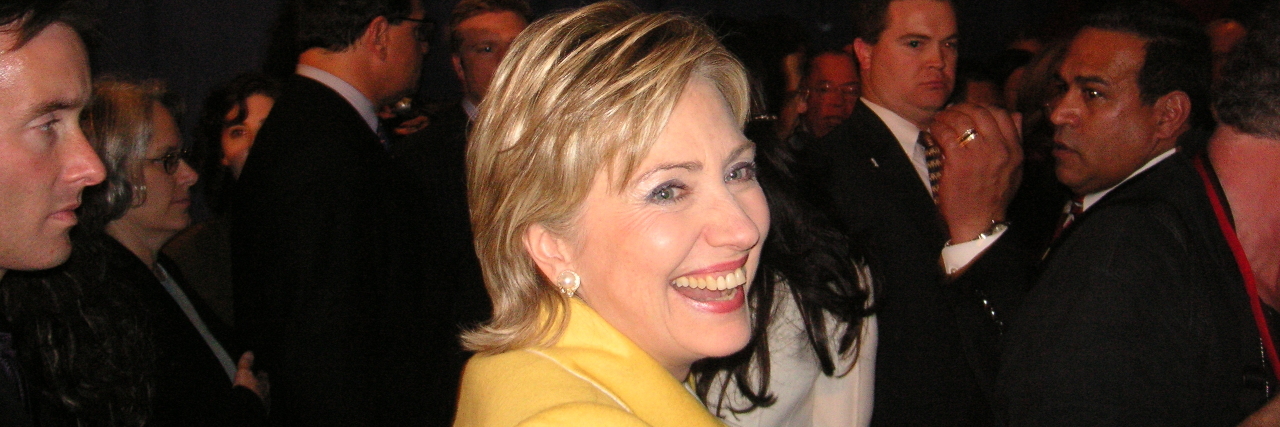How Hillary Clinton's Mental Health Plan Leaves Out Those With Serious Mental Illness
Editor's Note
This story reflects an individual’s experience and is not an endorsement from The Mighty. We believe in sharing a variety of perspectives from our community.
Donald Trump has not introduced a mental health plan, so we can’t evaluate it. But Hillary Clinton did introduce a mental health plan. Unfortunately, in my opinion, it is not as good as the bipartisan Helping Families in Mental Health Crisis Act (H. R. 2646), which passed the House by a vote of 422-2, and should be taken up by the Senate this week. It is not even as good a bill as combining Senator Alexander’s Mental Health Reform Act (S2680) with Senator Cornyn’s Mental Health and Safe Communities Act (S2002) would be.
The problem with the Clinton plan largely focuses on improving mental wellness in everyone, rather than helping those with serious mental illness. There are 43 million Americans who have a mental health issue, but only 10 million have “serious mental illnesses” including schizophrenia and bipolar disorder. An estimated 30 percent of the chronically homeless population has a serious mental illness, and those with serious mental illnesses are 10 times more likely to be in a jail or prison than a hospital bed.
That is the problem we have to focus on.
More money may not be the immediate answer. The federal government already increased mental health spending, but at the same time, it made the ability to get care inversely related to the severity of the illness. The easiest to treat have head of the line for services, while it’s too easy for those with serious mental illness to end up in jails, shelters and morgues. In my opinion, the Substance Abuse and Mental Health Administration (SAMHSA) encourages spending to go to irrelevant and useless programs and some that are actually harmful. H.R. 2646 puts a doctor at the helm of SAMHSA to try to stop that. The Clinton plan ignores the issue.
People who are experiencing psychosis and delusions, those who are hallucinating and “know” they are the Messiah, need hospital beds to get better. But there are not enough psychiatric beds — nearly 20 percent of the hospital beds for the nation’s most severely ill were eliminated in the last five years. The Helping Families in Mental Health Crisis Act starts to ameliorate the shortage of hospital beds.
Another problem is that anyone who is so sick they don’t recognize they need hospitalization cannot be treated until after they become “danger to self or others.” The bill that passed the House and the Mental Health and Safe Communities Act both address the inadequacy of our laws, which, as, ludicrous as it sounds, require dangerous behavior rather than prevent it. The Clinton plan does not.
The Clinton plan fails to fix the HIPAA regulations that sometimes prevent doctors from telling parents of children with mental illness what their child’s diagnosis is, what medications they should take and when their next appointments are. These regulations make parents of adult children powerless to see prescriptions are filled and appointments kept. Parents who provide housing, case management and transportation out of love need access to the same information paid providers receive in order to continue providing those services. The bill that passed the House, and can be taken up by the Senate provides a path to do that. The Clinton plan does not.
Ms. Clinton’s plan calls for yet another White House conference on mental illness. Presidents Kennedy, Carter, Clinton, Bush and Obama have all done that, and, in my opinion, made the problem worse. People with serious illnesses need services those who are higher functioning do not, and at these gatherings, those solutions are never proposed. The mental health industry comes in trotting a laundry list of alleged “risk factors” like bad grades and low self-esteem, and tells the President that if he invests in social services programs that they can prevent mental illness. Nonsense. There is no way to prevent serious mental illnesses like schizophrenia or bipolar disorder because we are not sure of the cause.
As a result of these conferences, numerous useless and tangential ideas get funded and people with serious mental illness get shunned. The only way for a White House mental illness conference to succeed would be to gather police and sheriffs rather than mental health industry executives. Law enforcement officers have become the real experts because unlike mental health executives, they can’t refuse to serve those with serious mental illnesses.
Instead of coming up with her own tweaks to the existing failure, I believe Clinton, and Trump as well, should urge Senate Majority Leader Mitch McConnell (R., KY) and Democratic Leader Harry Reid (D., NV) to bring Representatives Tim Murphy (R., PA) and Eddie Bernice Johnson’s (D., TX) bipartisan Helping Families in Mental Health Crisis Act (H. R. 2646) to a vote in the Senate. Or they should urge the Senate to combine the Mental Health Reform Act (S. 2680) with the Mental Health and Safe Communities Act (S. 2002) and pass that. Both paths would help ensure existing spending goes to solving real problems. Time is running out. Politics should stop. Call today and urge the Senate to pass the bipartisan plan.
I urge those who want to improve the mental health system to call Senate Majority Leader Mitch McConnell at (202) 224-2541 and the Democrat’s Senate Leader, Harry Reid at (202) 224-3542. Ask them to have the Senate pass the bipartisan Helping Families in Mental Health Crisis Act, HR2646 before they recess. You can also tweet to Senator Mitch McConnell (@SenateMajLdr) and Harry Reid (@SenatorReid).
To read Hillary Clinton’s full mental health plan, click here.
To read the Helping Families in Mental Health Crisis Act, click here.
From the National Alliance on Mental Illness: A Closer Look at Mental Health Reform Legislation
To follow Mental Illness Policy Org on Facebook click here or on Twitter click @MentalIllPolicy.

